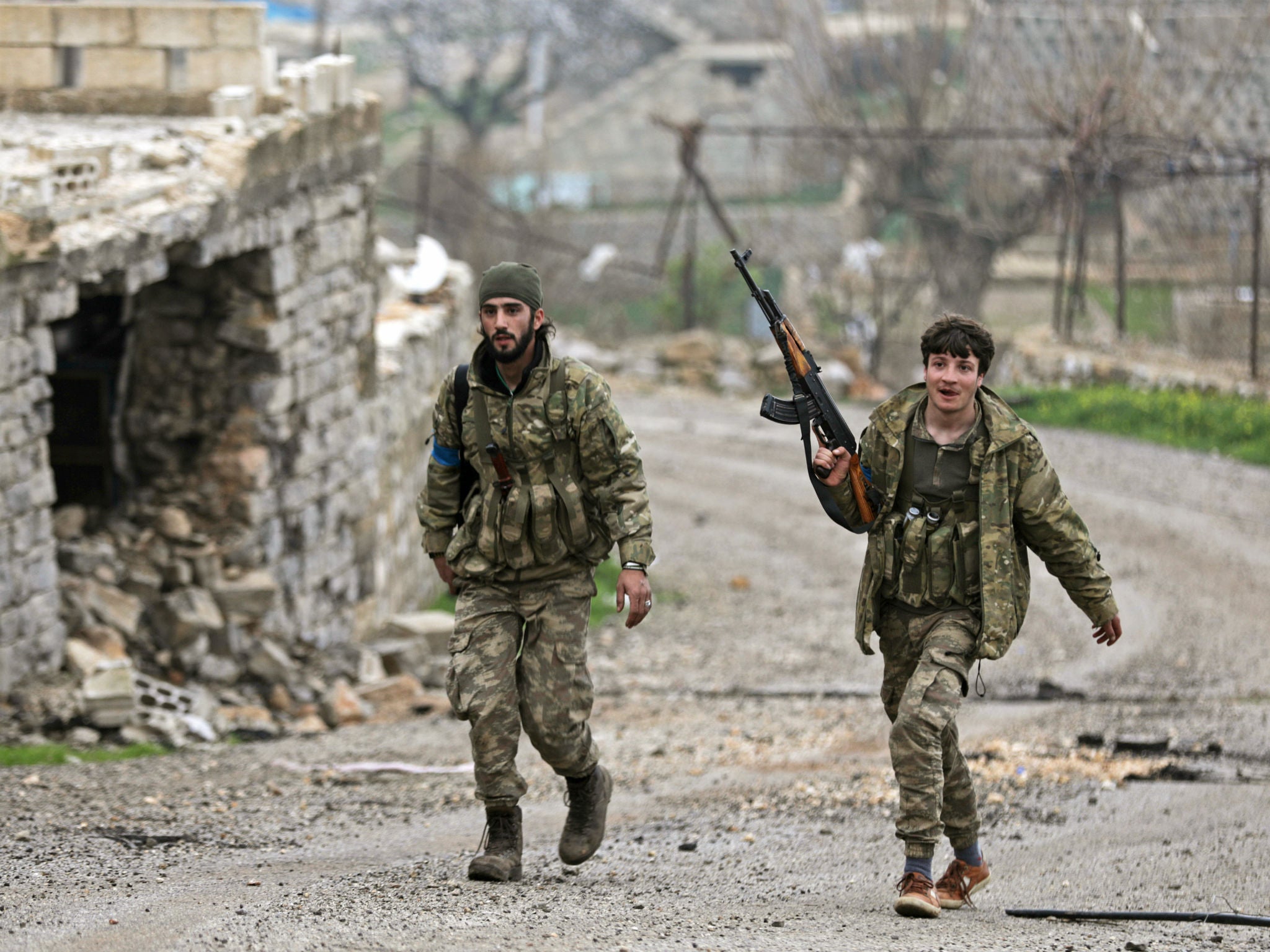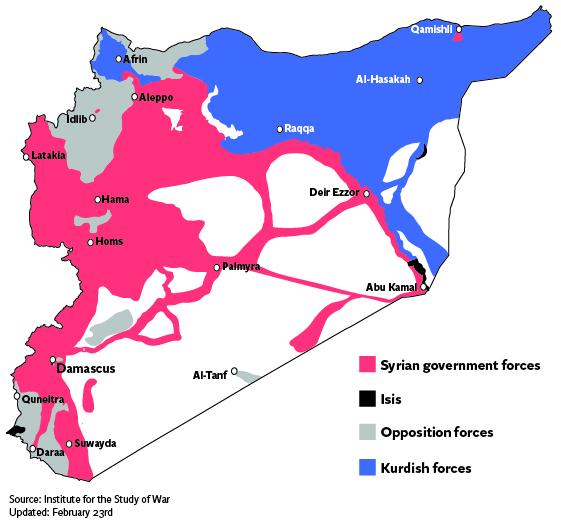Syria: Attack on Afrin will bring devastation and suffering like that seen in Eastern Ghouta, Kurds warn
The Wars in Syria: In the first of a new series, a senior Kurdish official tells Patrick Cockburn that conflict in Syria will last at least another four years, with no end in sight for civilian suffering

The Turkish attack on the Kurdish enclave of Afrin in northern Syria is likely to have the same devastating outcome as the Syrian army siege of Eastern Ghouta, destroying everything but failing to capture the area, says a senior Syrian Kurdish leader.
The official says it was inevitable that Afrin would come under siege, comparing it to Eastern Ghouta where hundreds of thousands of civilians have been left without food or humanitarian aid, adding that Afrin has a single supply line controlled by the Syrian government and the Russians “but they could block the way at any moment”.
Aldar Khalil, co-chair of the Movement for a Democratic Society, the Syrian-Kurdish dominated organisation that controls 30 per cent of Syria, also predicted that the war in Syria may last “another four years until a new balance of forces becomes clear”.
In an exclusive interview with The Independent in the city of Qamishli in north-east Syria, Mr Khalil says there are signs of a resurgence by Isis, whose fighters have taken advantage of the diversion of Kurdish forces to face the Turkish invasion of Afrin on 20 January, to make attacks in Deir Ezzor province in eastern Syria.
“It used to be we who were attacking Isis, but now we are losing fighters every day and we have had 170 killed since the start of the Turkish operation,” says Mr Khalil. Reports from the ground in eastern Syria and from former Isis strongholds in northern Iraq confirm that the movement, which appeared wholly defeated a few months ago, is showing renewed activity.
Mr Khalil has a bleak but highly informed view of the future of Syria, believing that there is a lot more fighting to come. He is adamant that the Kurdish paramilitary forces, the People’s Protection Units (YPG), will fight to the end for Afrin city and will never surrender. Given the dedication and battle experience of its combatants, who have been fighting Isis since 2015, a prolonged and bloody siege of Afrin is in prospect.
The Syrian government sent a force of militia into Afrin to oppose the Turkish-backed forces earlier this month, but Mr Khalil says their number was small and the action was symbolic. He does not see it as opening the door to a wider agreement between the Damascus government and its Kurdish minority, which would be an essential development if peace is to be restored. He says that the Kurds often sent conciliatory messages to the Syrian government, but have yet to receive a positive response.
The problem for the two million Syrian Kurds, a persecuted and marginalised minority before 2011, is that the war between President Bashar al-Assad and the armed opposition has enabled them to make great political and military gains, which will be difficult to retain. Syrian government forces withdrew from most of the Kurdish region in 2012 to concentrate on defending strategically more important areas. The YPG began to advance, but came under ferocious attack by Isis in 2014 which tried to capture the Kurdish city of Kobani. The Kurds defended it heroically, but the siege was broken by the intervention of the US air force at the cost of the destruction of 70 per cent of Kobani.

The US decided that the Kurds and the YPG were the ground force they had been looking for in Syria to fight Isis. The Kurds, backed by the devastating firepower of the US-led coalition air forces, defeated Isis and ultimately captured Raqqa, its de facto Syrian capital. This enraged Turkey which denounced the Syrian-Kurdish mini-state as being the Syrian wing of the Kurdistan Workers’ Party (PKK) which the Turkish army has been battling since 1984.
A crucial question since the fall of Raqqa has been whether or not the US would withdraw its 2,000 advisers and air support and abandon the Kurds. Mixed signals have been coming out of Washington on this. But Mr Khalil sounds confident that the US is not going to go. “I don’t think the US will leave Syria to the Russians,” he says.

At one time, Russia had a few troops in Afrin to deter a Turkish invasion and these were backed up by the Russian air force and anti-aircraft missile defence systems in northern Syria. Mr Khalil says the reason that the Russians gave a green light to a Turkish invasion was in retaliation for the drive of the Kurdish Arab forces into Deir Ezzor, depriving Mr Assad of Syria’s biggest oilfields.
Mr Khalil is convinced that the Russians will do nothing to stop the Turks, even if they attack Syrian government forces in Afrin. Russia’s close relationship with Turkey is too valuable to Moscow for it to put it at risk. “Even if all of Assad’s army goes to Afrin, Putin will not defend it,” says Mr Khalil.
Afrin has an estimated population of about 400,000 which is much the same as Eastern Ghouta. So far, the Turkish advance has been slow. In the last few days, despite the UN Security Council resolution calling for a 30-day truce in all of Syria, Turkish forces have been taking the borders of Afrin. There are air strikes every day, but on Afrin city only once or twice a week, though it is being hit by artillery. This is likely to change as the Turkish army and associated Arab militias try to fight their ways into urban areas and suffer heavy casualties. The lesson of the many sieges in the wars in Syria and Iraq is that bombers and artillery end up destroying almost everything in order to clear the way for their infantry. The outlook for Afrin, which has so far survived the seven-year war in Syria untouched, looks grim.
Mr Khalil is sure that the next great battle of the Syrian war will be fought in Afrin. He does not think that the Turks will attack the town of Manbij further east, as they have often threatened to do, because of the US military presence. He describes a Syrian political landscape in which all the players still believe they can be successful, making his belief that the Syrian war still has at least four more years to run sound horribly convincing.
Join our commenting forum
Join thought-provoking conversations, follow other Independent readers and see their replies
Comments
Bookmark popover
Removed from bookmarks